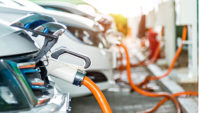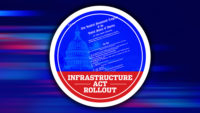The U.S. Dept. of Transportation and Dept. of Energy are taking actions aimed at bringing the envisioned national network of electric vehicle charging stations closer to reality. President Joe Biden has set a goal of having 500,000 EV chargers in place nationwide by 2030.
The DOT and DOE moves, announced on Feb. 15, include final minimum standards and Buy America requirements for the EV chargers and requirements for EV technicians who will install, operate and maintain them.
In a briefing for reporters, Mitch Landrieu, the White House infrastructure implementation coordinator, said the new standards would “help create a national network of chargers that will work for everyone, everywhere, no matter what type of car or state they’re in.”
Landrieu said there are more than three million EVs on the roads and 130,000 public chargers nationwide.
DOT’s Federal Highway Administration said the standards and implementation plan now put states in position to deploy the initial $1.5 billion in Infrastructure Investment and Jobs Act formula funds FHWA allocated for this several months ago.
It also allows states, cities, towns and tribes to apply for $700 million in discretionary EV grants available under the IIJA.
Grants for Key Truck Corridors
The package of announcements includes only a modest amount of actual funding: $7.4 million for seven planning projects to speed progress on new zero-emission freight corridors through EV charging infrastructure for medium- and heavy-duty trucks in major truck-freight corridors.
The selected projects are located in 23 states. They include: the Interstate-95 corridor on the East Coast; the I-80 corridor in the Midwest; Houston-Los Angeles on I-10; Southern California’s I-710 freeway; parts of New England and the Mid-Atlantic states; the San Francisco Bay Area; and the Salt Lake City area.
Coming: Discretionary Grants
More funding will be coming for EVs via the discretionary grant program, which is to total $2.5 billion over five years. DOT Secretary Pete Buttigieg said officials are “very close” to launching the application process for the $700-million first round of those grants, which will go for chargers in urban and rural areas, with a particular focus on disadvantaged communities.
Buttigieg also said those funds will go to areas that are not covered by states' charging networks so far and that “maybe have been overlooked by private-sector investment today—areas that may not yet be profitable but are very important for the country as a whole to have charging available.”
The new standards take effect 30 days after they are published in the Federal Register.
New Standards
Among other things, the standards require a minimum of four ports per charging station, and that the stations must be open 24 hours a day, seven days a week and accept all major credit and debit cards.
They also mandate that states put in place physical and cybersecurity strategies to protect consumers' data and guard against the risk of harming the infrastructure and the electric grid, and measures to ensure the interoperability of the chargers and the networks.
The package also requires that EV technicians have certification from the Electric Vehicle Infrastructure Training Program or graduation or a continuing-education certificate from a registered apprenticeship program.
Buy America
Among Buy America mandates, all manufacturing of EV charger enclosures and housings composed of steel or iron must take place in the U.S. That requirement is to take effect immediately, according to a White House fact sheet.
The 55% domestic content requirement for EV charging equipment will take effect July 1, 2024. Also, any charging equipment that does not meet the 55% requirement must be installed by Oct. 1, 2024.
The administration's actions won praise from environmental and manufacturing groups. Katherine Garcia, director of the. Sierra Club’s Clean Transportation for All campaign, called the announcements “a game changer for EV charging.”
Scott Paul, president of the Alliance for American Manufacturing, said in a statement that the DOT-DOE moves represent “significant progress in realizing a cleaner future that’s made in America.”





Post a comment to this article
Report Abusive Comment